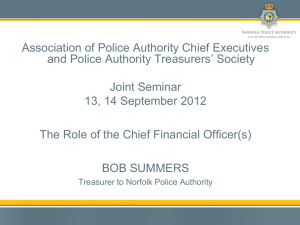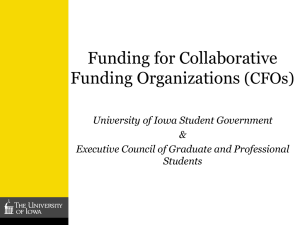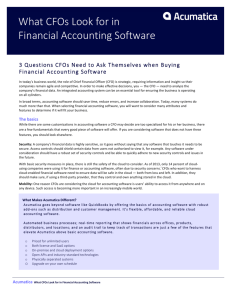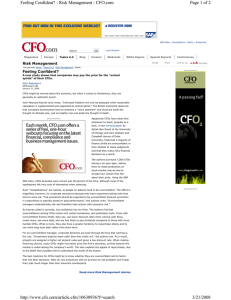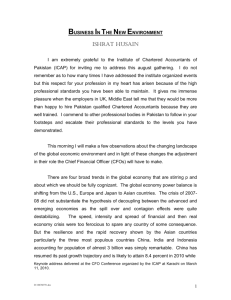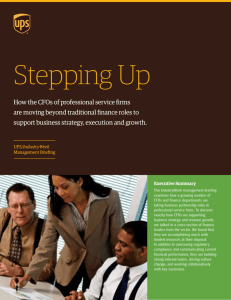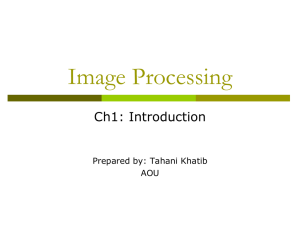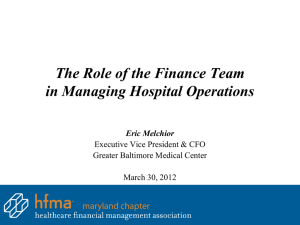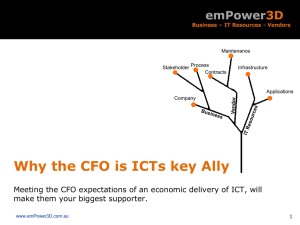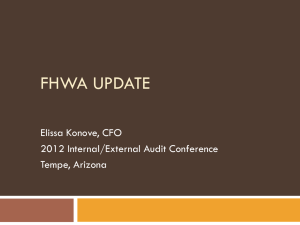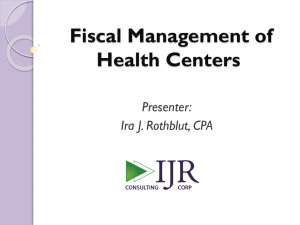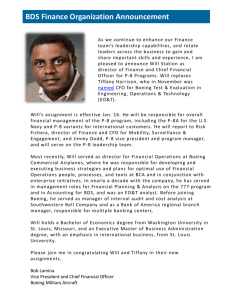CFO`s are saying - IMA Michigan Council
advertisement
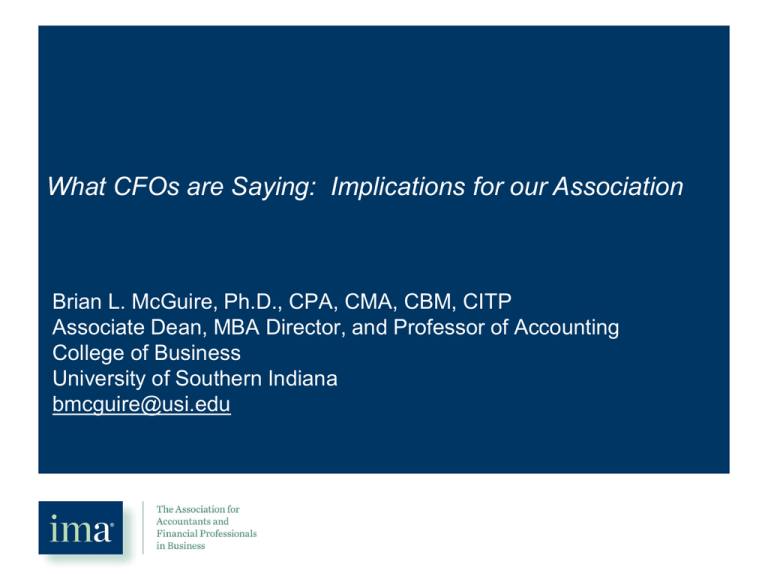
What CFOs are Saying: Implications for our Association Brian L. McGuire, Ph.D., CPA, CMA, CBM, CITP Associate Dean, MBA Director, and Professor of Accounting College of Business University of Southern Indiana bmcguire@usi.edu Discussion Agenda • A market view of what “CFO’s are saying” • What are the implications for our association in terms of meeting the stated market need? • Are we doing “good enough” to meet these needs? • A bit of brainstorming: How can we do better to meet the needs of the profession, and, in serving accountants and financial professionals in business (aka, the CFO team)? Critical Business Issue: CFO Team Not Achieving Aspirations Stakeholder Sophistication Globalization Compliance Demand Supply Current Reality: • Transaction – Heavy • Counter of Wealth • Some Influence • Processes • People • Education, Certification Aspirations: • Partnering & Consulting • Creator of Wealth • Maximum Influence CFO Global Research Study Sources • The New Value Integrator, Insights from the Global Chief Financial Officer Study, IBM, 2010 • Being the Best, Insights from Leading Finance Functions, KPMG and the Economist Intelligence Unit, 2006 • Balancing Risk and Performance with an Integrated Finance Organization, IBM, The Wharton School and Economist Intelligence Unit, 2007 • The Changing Role of the Finance Organization in a Multi-Polar World, Accenture, 2008 • IMA Research Studies 4 Page 4 What CFOs Are Saying …. Bottom Lines • Aspire to move from counter of wealth and compliance cop to creator of wealth and influencers of strategy. • This requires a whole new set of MA/finance function skill sets. • Sourcing these new skill sets is problematic and therefore they tend to be “home grown” especially in larger enterprises with funds. • Can you name an association “primed” to help close these critical skills and competency gaps on the CFO team, around the globe?? What CFOs Are Saying …. Required Skill Sets FROM TO include Budgeting Integrated Planning, Budgeting, Forecasting Excel Forecasting Predictive Analytics/Business Intelligence Financial Risk Identification Broader Enterprise Risk Management Product Profitability Customer Profitability/Lifetime Value (CLV) Primarily financial metrics which are lagging indicators Balanced metrics – the 3 P’s (Profits, People and Planet) – which include leading indicators Soft skills nice to have Soft skills required to become a credible analytical influencer – LEADERSHIP!! Analytical capability helpful Data analytics a competitive advantage The CFO Skills Gap Has Been Recognized - Have We Made Progress? “There is little doubt that the current content of professional accounting education, which has remained substantially the same over the past 50 years, is generally inadequate for the future Accounting professional. A growing gap exist between what accountants do and what accounting educators teach… Accountants who remain narrowly educated will find it more difficult to compete in a expanding profession….” Source: American Accounting Association Bedford Report, GUESS THE DATE - ? Key Findings – IMA Primary Research Significant Research with Employers & CFOs Confirmed • CFOs need to raise the competency of their teams • There exists a skills gap at all levels, including the business analytical level • Planning and analysis capabilities are needed in organizations • There is a challenge identifying “advanced” or high potential finance and accounting staff • University accounting and finance curriculums provide a good theoretical grounding, but do not develop in enough depth the skills most needed on the job 8 8 CFO Dissatisfaction … We Must Do Better The Economy and its Impact on the Role of CFO’s • The economic downturn has put a spotlight on CFOs and their organizations • Urgent needs for capital acquisition, cash flow management and revenue challenges demanded swift action and agility • IBM’s 2010 Global CFO Study – based on input from 1,900 CFOs and senior financial leaders – finds that CFOs are emerging with far more influence at the enterprise level 10 The CFO as Value Integrator • It’s no longer “good enough” to excel at core finance activities • The finance operation needs to advise on strategic and operational issues too • The “integrator” role involves “efficiency” and “insight” • The Value Integrator’s mission should be to help the company “think as an overall business instead of individual areas”. • The CFO is migrating to CVO (Chief Value Officer), and of course, in smaller operations serves as OFO (Only Financial Officer)! 11 IBM CFO Research Insights The New Value Integrator, Insights from the Global Chief Financial Officer Study, IBM, 2010 12 Transaction Processing Still Dominates ….. The New Value Integrator, Insights from the Global Chief Financial Officer Study, IBM, 2010 13 But, CFOs Stepping up in their “Trusted Business Advisor” Role Source: IBM Global CFO Study 14 The CFO Team: Rear View Mirror + Magnifying Class + Crystal Ball!! REAR VIEW MIRROR MAGNIFYING GLASS CRYSTAL BALL What happened? What exactly is the problem? What will happen next? How many, how often? Why is this happening? What if the trends continue? What actions are needed? What are the risks/opportunities? REAR VIEW CURRENT VIEW FORWARD-LOOKING VIEW Balance sheet, P&L and cash flow statements Customer, product & market profitability Cash forecasting Revenue & cost variance analysis Spend optimization Scenario-based planning & forecasting Working capital analysis Strategic investment & decision support Market, customer & channel pricing Volatility & risk-based predictive & behavioral modeling Sales & supply chain effectiveness 15 Deloitte: Your Turn – Rebound Big Time “From Cautious Optimism to Strategic Action” (October, 2009) “Do you take bold steps to gain market share or focus on streamlining operations? Every organization must choose its own path, but there are business imperatives every company must embrace: Investing in Growth Driving Efficiency Managing Risk Meeting Compliance Obligations” Is the “CFO Team” well positioned to play a leadership role in each of these areas?? 16 Market Implications for IMA – Value, and, Values Creating Value is the key to sustainable growth and “step” changes in performance. Organizations must have an unwavering quest to improve the value proposition while better articulating the current value proposition in a (“1 or 2 floor”) elevator speech. Creating Value is all about caring for our members (“customers”, “shareholders”, etc.). However, Creating Value on a sustained and ethical basis is not possible without a consistent passion to also care for the people who are the heart and soul of any organization (e.g., staff, volunteers). This care starts with a set of foundational Values that are guideposts for organizational and individual behavior. IMA Global Staff: “Our Core Values” (Example) Respect for the Individual Passion for Serving Members Highest Standards of Integrity and Trust Innovation and Continuous Improvement Teaming to Achieve • • • • Suggest the CEO develop the values, not the Committee or the Consultant. Tone at the Top – “people are watching their leaders” Integrate values into Performance Management System Much like a technical framework exposure draft, strongly consider a formal “comment period” for employees – they must weigh in before they buy in. Building Core Values Into Your Appraisal Process Section II: Individual Performance Weight Weight Executes core job repsonsibilities (please see table below for 1. individual core job responsibilities). 50% 2. Demonstrates value Respect for the Individual 10% Rating 25% Total 5. Significantly Exceeds Expectations 4. Exceeds Expectations 3. Demonstrates value Passion for Serving Members 10% 4. Demonstrates value Highest Standards of Intergrity and Trust 10% 3. Meets Expectations 2. Below Expectations 1. Unsatisfactory 5. Demonstrates value Innovation and Continous Improvement 10% 6. Demonstrates value Teaming to Achieve 10% Total 100% IMA Strategy: How are we doing? • • • • • • • • Fiscal Yr. 2010 (ending in June 2010) set a solid foundation for growth Second consecutive year with a solid operating surplus after several years of deficits, enabled by CMA candidate growth and rigorous cost management. Net growth of over 5,500 members in the face of a recession, and after decades of decline. CMA new applicants (about 12K) nearly double prior year, with over 23K active CMA candidates. Over 1,500 new CMAs, highest total since 1997. An unwavering focus on member value and service, including LinkUp IMA, chapter/council support, webinars, CPE, research, publications and more! New branding (logos, etc.) and new CMA exam announced. Dozens of new chapters formed or revitalized enabled by sharing of best practices and alignment with global – spread the word! IMA is healthy again – financially and emotionally! We have a spirit of winning, not whining! Sustaining the Gains through Technology and Innovation Fiscal Yr. 2011 (ending in June 2011) budget approved 6/5/10 • An additional headcount added to Chapter/Community support (four in total) with a 12% year over year increase in chapter compensation. • A major focus on technology enablement, with the following DELIVERED: – A new Association Management System (AMS; similar to ERP/CRM). – A new website. – A new Learning Center to manage all courseware. • A focus on managing the risk of losing members from the “exam bump”, especially for CMA candidates outside the U.S. • New U.S. growth initiatives, including universities, corporate development, a direct mail campaign, word-of-mouth marketing campaign, enabling a robust course provider network, and more. • An emphasis on more agile and innovative professional development courseware, including an e-learning series in risk management and internal controls this Fall! CMAs Serving As Trusted Business Advisors Your Career Financial Leadership Risk Management CMA Strategic Cost Management Internal Controls Budgeting & Planning The CMA Program: Our Market Differentiator and “Gap Filler” • • • • A rigorous, highly respected credential for accountants and financial professionals in business which requires passing a rigorous and focused two-part exam. Recognizes expertise in the critical skills needed to be a trusted business advisor, such as financial planning and analysis, risk management and internal controls, and more. The CMA is a global passport, not a local license. CMAs earn 25% more than noncertified professionals with access to a broad range of career opportunities (June, 2010 Strategic Finance Magazine). 23 Take a Tour – IMA’s Pillars of Value Discussion Time • What are the implications for IMA in the context of “what CFO’s are saying”? • Is the current value proposition – Unclear – Clear, but needs some “Windex” – Crystal Clear • How can we better communicate our value proposition? • What additional value must we generate?? THANK YOU FOR YOUR TIME, AND, FOR YOUR SERVICE!! 10 Paragon Drive, Suite 1 Montvale, New Jersey 07645-1760 U.S.A. (800) 638-4427 (201) 573-9000 © copyright 2010 Institute of Management Accountants
